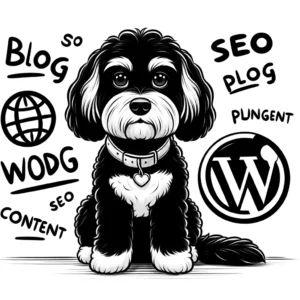Overview of Elementor
Elementor is a leading WordPress page builder plugin, recognized for its intuitive drag-and-drop interface. It allows users to create complex layouts visually, without the need for coding knowledge. The powerful editor provides a real-time design experience, enabling the creation of sophisticated, pixel-perfect websites with ease.
The plugin offers a wide array of widgets that serve as building blocks for pages. These widgets can be positioned inside sections and columns to craft versatile designs. Elementor’s capabilities extend beyond static pages; it’s also adept at producing dynamic content.
With an emphasis on responsive design, Elementor ensures that web pages look great on all devices. Users can toggle between desktop, tablet, and mobile views, adjusting the layout and design elements to suit different screen sizes.
Here’s what Elementor brings to the table for WordPress website development:
- Interface: A clean and user-friendly visual editor.
- Drag-and-Drop: Simplifies the page-building process.
- Widgets: Offers a vast selection for various functionalities.
- Sections: Containers that structure the page layout.
- Layouts: Pre-designed templates to kickstart a design.
- Responsive Design: Optimized for mobile and tablet views.
Elementor is designed for those who wish to build complex layouts without touching a line of code. It caters to professionals and novices alike, offering a compelling suite of tools for creating modern and responsive websites within the WordPress ecosystem.
Key Features of Elementor
Elementor is a WordPress page builder with a wide array of functionalities aimed at efficiency and design excellence.
Templates and Blocks
Elementor offers a vast collection of pre-designed templates and blocks that simplify website creation. Users can pick from a variety of page templates and landing pages that are easily customizable. The Elementor Pro version expands this library, providing additional professional-grade templates.
Professional Tools and Widgets
With Elementor, there is a suite of professional tools and widgets at the user’s disposal. This includes a form builder for creating contact forms, a popup builder for engaging calls to action, and global widgets that save time by reusing elements across the site. Elementor Pro users gain access to advanced capabilities such as the WooCommerce builder for e-commerce sites.
Design Capabilities
Elementor’s design capabilities allow users to style their sites with a high level of detail. They can adjust fonts, colors, and backgrounds, as well as incorporate various motion effects and visual effects to create a truly custom look and feel.
Responsive Design and Editing
Elementor’s responsive design feature is critical for ensuring websites look great on all devices, including mobile, tablet, and desktop. The platform’s visual editor allows for real-time adjustments across different device views, giving users the ability to create fully responsive designs with ease.
Ease of Use
Elementor’s standout feature is its ease of use, manifested through a user-friendly interface and significant customization flexibility. It aims to cater to both novice users and professional developers by providing an intuitive experience and extensive customization options.
User Interface
Elementor’s unique selling point is its drag-and-drop interface, which makes it an excellent choice for users without coding skills. The visual layout of the page builder allows users to see the changes they make in real-time. They can simply select a widget and drag it to the desired location, streamlining the page-building process. The editor offers a clean and organized workspace where all tools are readily accessible, ensuring a smooth workflow.
Customization and Flexibility
For more advanced users, Elementor offers custom CSS capabilities, granting the freedom to apply specific styling to any element. The flexibility here is significant; it means that while you can use the visual editor for most tasks, there’s always the option to tweak or thoroughly customize using CSS. Moreover, the page builder’s wide range of widgets and templates further enhances its customization and flexibility, allowing users to tailor their layouts and functionalities to match their vision without having to write a single line of code.
Comparisons With Other Builders
When evaluating Elementor as a page builder for WordPress, understanding its strengths and drawbacks compared to other notable builders like Divi and Beaver Builder, as well as its broader positioning among WordPress plugins, is crucial. This comparison will illuminate Elementor’s functionalities, user interface, and customization capabilities against its competitors.
Elementor vs. Divi
Elementor excels with its user-friendly drag-and-drop interface, offering a high level of customization without the need for coding skills. The users can enjoy a plethora of widgets and templates that ease the design process. On the other side, Divi brings its own unique advantages to the table, such as a wide array of pre-designed templates and the ability to customize every aspect of a site. Divi is both a theme and a plugin, which distinguishes it from Elementor that primarily operates as a plugin. Users must consider whether the ability to use a club membership with access to multiple themes and plugins in Divi’s ecosystem outweighs Elementor’s extensive widget selection.
Elementor vs. Beaver Builder
While Elementor leads in popularity with a comprehensive range of features designed for web creators of all levels, Beaver Builder is recognized for its stability and ease of use, which appeals to those who prioritize simplicity and reliability over extensive features. Unlike Elementor’s all-in-one approach, Beaver Builder tends to focus on delivering a robust, clean, and less overwhelming page-building experience. It is critical to identify if the need for a straightforward and developer-friendly interface in Beaver Builder is a priority over the feature-rich environment provided by Elementor.
Elementor vs. Other WordPress Plugins
When it comes to comparing Elementor with other WordPress plugins, Elementor is acknowledged for its active community and continuous updates which is significant for users seeking a dynamic and evolving page building experience. Other WordPress site builder plugins may offer specialty functionalities or niche design elements that Elementor does not prioritize. It is essential to determine whether Elementor’s extensive integrations and regular enhancements align with one’s website objectives compared to other specialized WordPress plugins.
Elementor for Developers
Elementor provides developers with robust features for advanced customization, an array of developer resources, and seamless third-party integrations. These tools equip developers to extend the functionality and design capabilities of WordPress websites.
Advanced Customization
For developers requiring deeper customization options, Elementor’s interface allows the addition of custom CSS right within the page builder. The ability to apply CSS on a per-widget or per-section basis enhances the control developers have over the styling. Additionally, Elementor exposes various hooks and an extensive API, enabling programmers to tailor the editor and its elements to specific project needs.
Developer Resources
Elementor’s comprehensive documentation serves as an essential resource for understanding and utilizing the various developer-oriented features. The documentation covers a range of topics from how to create shortcodes to leveraging Elementor’s hooks for actions and filters. Developers will find the explanations and examples in the documentation to be instrumental for custom development.
Third-Party Integrations
Elementor natively supports a multitude of third-party integrations. This includes popular ecommerce platforms like WooCommerce, as well as various CRM systems. These integrations are crucial for developers working on ecommerce sites, enabling them to build powerful, sales-focused pages that integrate seamlessly with business tools. The plugin’s capacity to work with a plethora of add-ons means that developers can significantly extend its functionality without compromising on performance or reliability.
Pricing and Support
Elementor offers both a free and a premium version, each catering to the varied needs of WordPress site builders. Pricing structures for the Pro version are tiered to fit different user levels, while support and updates are provided. Elementor’s enthusiastic community and ample resources further supplement the users’ experience.
Elementor Free vs. Pro Version
The free version of Elementor provides basic functionality, allowing users to build a stylish WordPress site with essential features. However, for advanced capabilities, users can opt for Elementor Pro. Pricing for Elementor Pro starts from an annual subscription and offers:
- Comprehensive design elements
- Premium widgets
- Full theme building
- WooCommerce integration
- Updates and premium support
Elementor Pro’s pricing tiers are:
- Essential: 1 site – suitable for single site owners.
- Advanced: 3 sites – designed for a few sites.
- Expert: 25 sites – ideal for freelancers and small agencies.
- Studio: 100 sites – tailored for growing studios.
- Agency: 1000 sites – best for larger agencies that handle many client sites.
Customer Support
Elementor Pro users gain access to premium support services. This includes a help center, 24/7 premium support for critical issues, and an extensive revision history feature to track changes and updates. Free version users can rely on a comprehensive knowledge base and FAQs for self-service assistance.
Community and Resources
Users can also leverage the extensive Elementor community. It provides:
- A vibrant user forum
- Meetups and organized community events
- Educational resources and tutorials on the official Elementor site
These resources help users to maximize their use of both the free and Pro versions of the plugin, ensure they stay up to date with any updates, and extend their capabilities beyond what’s included out of the box.














